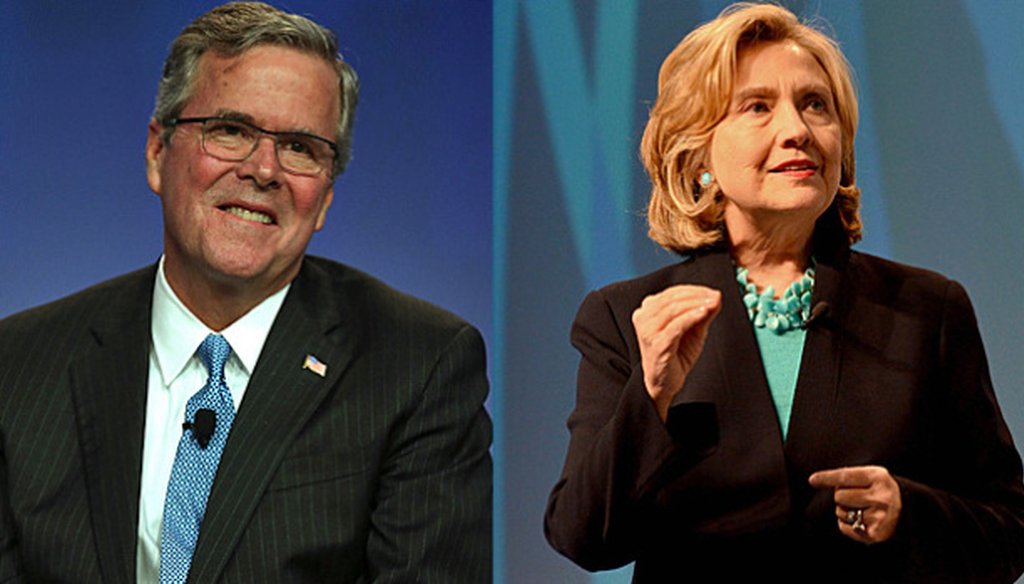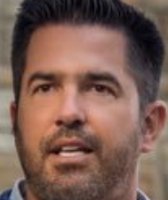Stand up for the facts!
Our only agenda is to publish the truth so you can be an informed participant in democracy.
We need your help.
I would like to contribute

Jeb Bush and Hillary Clinton will both appear at the National Urban League conference in Fort Lauderdale July 31, 2015. (Getty images)
It may not be the last time they face off, but Jeb Bush and Hillary Clinton take their messages before a key demographic -- black voters -- when they give speeches at the National Urban League conference in Fort Lauderdale July 31.
While black voters overwhelmingly register as Democrats, Bush has said he will campaign where Republicans often don’t, including before black audiences.
Founded in 1910, the National Urban League is a civil rights organization that works for economic empowerment in historically underserved urban communities.
All of the 2016 candidates were invited to speak, but the only other ones who will participate -- in addition to Bush and Clinton -- are Democrats U.S. Sen. Bernie Sanders, I-Vt., and former Maryland Gov. Martin O’Malley, and Republican Ben Carson, a black neurosurgeon who retired to West Palm Beach.
Here are six fact-checks of claims by Bush, Clinton and Sanders about purges of the voter rolls, education and African-American unemployment:
Bush
At the Conservative Political Action Conference, Bush said that eliminating affirmative action in admissions led to "more African American and Hispanic kids attending our university system" than before.
That statement is exaggerated. We found that the raw numbers of black and Hispanic students are up, but the percentage of black students in the Florida’s state university system is down slightly since Bush’s 1999 executive order. The number of Hispanic students has gone up considerably, but that is partly due to a recent change in how students report ethnicity during the admissions process.
There’s no hard evidence that Bush’s One Florida program had much to do with the enrollment growth. Experts say demographics, graduation rates and state-sponsored scholarship money have had more influence. So we rated his statement Mostly False.
Bush, speaking at a business roundtable in New Hampshire in March, said Florida is "one of the few states that has actually had a narrowing of the achievement gap based on income, or based on race or ethnicity."
There's evidence to support that. Changes in the achievement gap can vary widely depending on the years studied, the tests chosen and the student groups measured, but Bush can point to fairly strong evidence that the black-white gap is narrowing, as well as fairly weak evidence of improvements in the white-Hispanic gap and modest evidence to back up gains among poorer students.
As for how unique Florida is in narrowing the achievement gap, Bush has a point that it was the only state to consistently close the gap between black and white students, at least on math and reading tests between 2003 and 2013. The state wasn’t a national leader in closing the achievement gap between whites and Hispanics, though Florida’s Hispanic students are a leader on fourth-grade reading scores.
On balance, we rated his claim Mostly True.
Clinton
In a speech on voting rights in June, Clinton said, "In Florida, when Jeb Bush was governor, state authorities conducted a deeply flawed purge of voters before the presidential election in 2000" and "in 2004 a plan to purge even more voters was headed off."
Her description is largely accurate. Clinton glossed over the fact that this effort began before Bush was in office, but it did continue under his watch. The first purge grew out of thousands of corrupt votes cast in a Miami mayoral election in 1997, which led to an elections overhaul in 1998. The bill went into effect without the signature of Gov. Lawton Chiles, a Democrat. Numbers varied widely regarding how many Floridians were wrongly purged leading up to the 2000 election. In 2004, the state scrapped another purge after officials admitted errors.
We rated her claim Mostly True.
Speaking at a black church near Ferguson, Mo., after the shootings in Charleston, Clinton said, "Our schools are still segregated, in fact, more segregated than they were in the 1960s."
Clinton would have been more accurate if she’d set her time frame a little later. But she has a point that the country has fallen back from the higher levels of diversity that existed between the 1970s and the early 1990s. On the whole, we rated her statement Mostly True.
Sanders
At a rally in Portland, Maine, Sanders said that for African-Americans between the ages of 17 and 20, the "real unemployment rate … is 51 percent." His terminology was off, but the numbers he used check out, and his general point was correct -- that in an apples-to-apples comparison, African-American youth have significantly worse prospects in the job market than either Hispanics or whites do. The statement was accurate but needed clarification or additional information, so we rated it Mostly True.
Meanwhile, Sanders said in an interview on PBS that "a black male baby born today, if we do not change the system, stands a one-in-three chance (of) ending up in jail."
This calculation, while it’s the most recent one available, is 14 years old, and changes in the underlying data suggest that the actual odds of incarceration may be somewhat smaller today. Still, other evidence suggests that blacks have a disproportionate likelihood of ending up in prison. On balance we rated it Mostly True.
Spot a claim in the presidential race we should fact-check? #PolitiFactThis or [email protected]
Our Sources
See individual fact-checks for sources
































